In this guide, we get right into what you want from an ecommerce platform: top-notch features, affordability, and solid customer support. We’ll explore the absolute best ecommerce platforms in general, then narrow them down based on certain use cases.
The best ecommerce platforms are the tools that help business owners to connect with their audience, and make a profit in the digital world. Leading tools come with virtually everything an organization needs to thrive online, from customizable checkout pages, to payment processing tools, and even marketing solutions for email, social media, and SEO.
Of course, choosing a reliable, effective, and powerful ecommerce platform in 2023 can be easier said than done. There are countless amazing solutions out there like Shopify and Wix, many of which have similar features and functionality. Comparing your options can take longer than you’d think.
Fortunately, we’ve created this guide to help. Today, we’re going to take a closer look at some of the most popular, well-loved, and valuable ecommerce platforms around. We chose these options based on their overall reputation, the capabilities they can offer, and even their price points.
Let’s dive in.
What is an Ecommerce Platform?
Let’s start with the basics – what actually is an ecommerce platform?
An ecommerce platform is a software solution, designed to provide business owners with the tools they need to set up a digital store and begin selling online. Each platform on the market today comes with its own unique set of capabilities. However, virtually every ecommerce tool will have the core functionality companies need to manage an online retail business.
Most solutions will allow you to build online stores (with your own custom domain name), complete with blog pages, product pages, and checkout options. They’ll also feature tools for managing transactions, order fulfilment, customer support, and returns. Some offerings can also include advanced solutions for specific business needs, such as POS integrations or options for multi-channel selling across marketplaces and social media platforms.
The overall “best” ecommerce platform for you will depend on your business model, sales strategy, and overall plan for growth. However, we’ve chosen the 9 options above based on their ability to appeal to a wide range of business types.
The Absolute Best Ecommerce Platforms
After extensive research and testing, we narrowed the search for the best ecommerce platforms to these options:
- Shopify – Best overall
- Wix – Best for Beginners
- BigCommerce – Best for mid to large business
- Squarespace – Best for Creatives
- Square Online – Best for retailere
- Ecwid – Best for small business / startups
- EDD – Best for Selling Digital Goods
- Medusa.js – Best Open Source Platform
- WooCommerce – Best for WordPress Sites
- Webflow – Best for No-Code Store Design
Keep reading to learn about which are the best ecommerce platforms for:
- General use
- Beginners
- Mid to large businesses
- Creatives
- Retailers
- Small businesses and startups
- Selling digital goods
- Running your site on an open source system
- WordPress sites
- No-code store design
What to Look for When Choosing the Best Ecommerce Platforms
It's important to recognize that not all ecommerce platforms are equally suitable for all brands. Therefore, it's recommended to compile a list of essential features that you require before beginning your platform search. What may be the best ecommerce platform for one store could potentially result in higher expenses for other businesses in the future.
Here is a list of must-have features to guide your search:
- Reasonable, scaleable pricing: within your budget and flexible enough to grow with your business
- Support for enough products: do you need to sell 10 or 1,000 products?
- Payment gateways that work for your business: some payment processors only work in some countries, or for certain industries. Make sure you check to see that your ecommerce platform supports the payment gateway you want.
- Design elements suitable for your skill level: are you a developer who wants full coding customization, or a complete beginner? Do you want a drag-and-drop builder or a visible section-based builder? And does the platform provide quality templates?
- Integrations and built-in tools: You want to ensure that your ecommerce platform has all the unique features you need to run your business. If not, make sure it has a large collection of apps or integrations to complete the construction of your store.
- Great customer support: online documentation is good; chat/email support is better; phone support is best, especially when money is on the line.
- Marketing tools: like email marketing, social selling, and search engine ads.
- Ways to source products and ship them to customers: these often come in the form of apps or integrations.
Keep reading to learn all about the best ecommerce platforms from our in-depth testing.
Our Methodology
What are the Best Ecommerce Platforms in 2023?
1. Shopify – Best overall
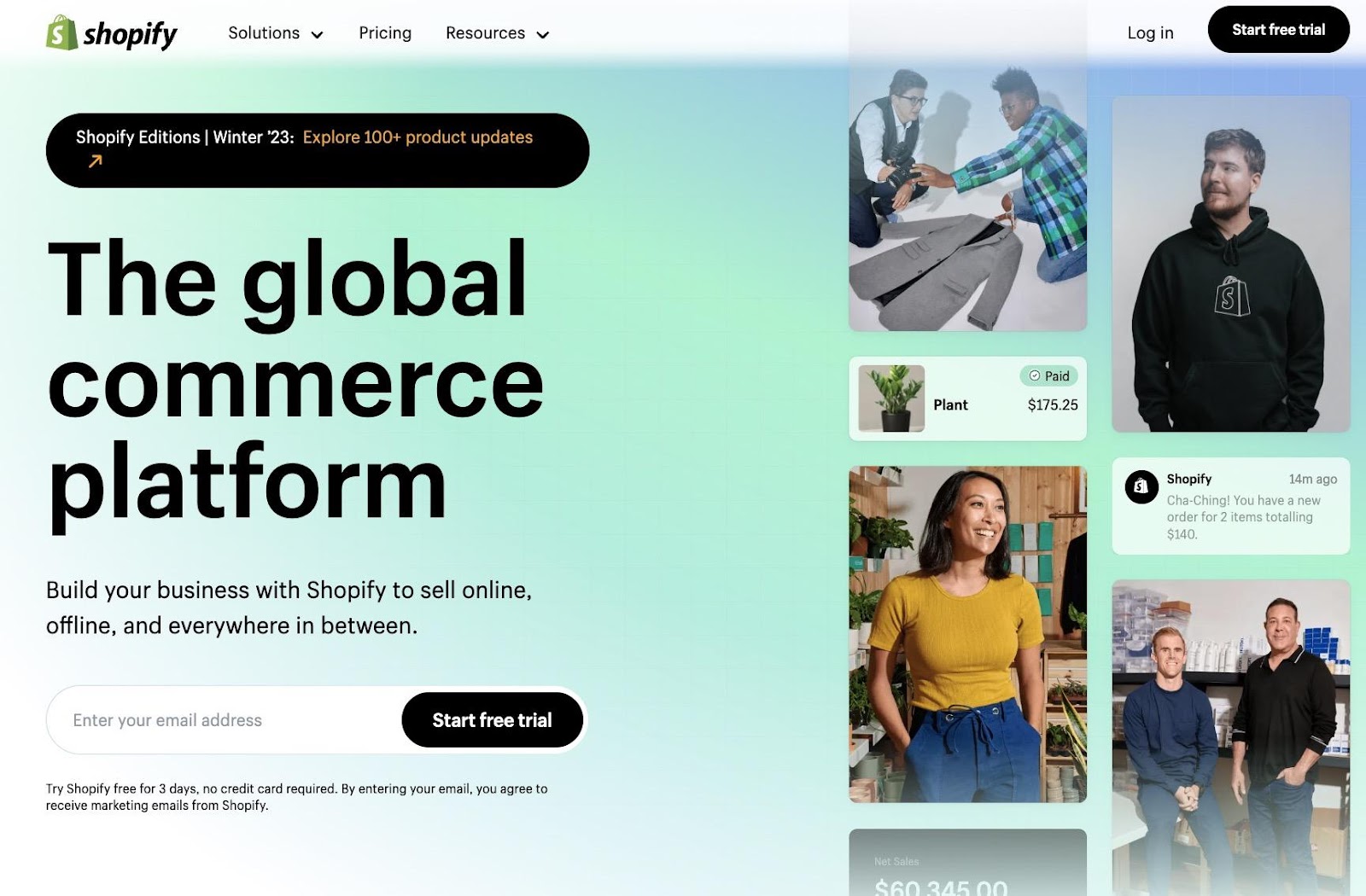
Shopify is packed with many useful features, and its developers consistently gather feedback from users to release updates and new products that cater to their needs. It's a popular choice for businesses around the world looking to create an online store, and in our view, it's the top ecommerce platform available.
Home to millions of merchants, Shopify fuels 10% of the entire ecommerce industry in the US. It also provides an impressive ecommerce community for business owners, developers, partners, and entrepreneurs. The reason Shopify has grown in popularity is due to its sleek interface, reasonable pricing, and its flexibility with all types of stores. For instance, you can run a retail point of sale with Shopify POS Go, while also handling a multichannel selling campaign through the Shopify dashboard. It’s one of the best ecommerce platforms for fulfilling orders affordably and quickly, and it’s definitely the best when it comes to managing your entire business in one place.
Pricing
Shopify offers monthly subscriptions, but you can save a significant amount of money by opting for the yearly plans (25% to be exact).
Here are the plans:
- ‘Starter‘: $5 per month; this is not a real online store, rather a selling option for influencers and content creators who’d like to list and process payments for products on their current blogs or social pages. It’s not for true ecommerce businesses. The plan features a sleek landing page and links to add to social sites, selling through WhatsApp and Instagram, order management, and Buy buttons to include on a blog.
- ‘Basic‘: Starting at $32 per month (for the yearly plan), this package is the standard for entrepreneurs to launch a real online store with a shopping cart and checkout module. You can list unlimited products, sell on sales channels, and build a website with a visual page builder. Other features include gift cards, manual order creation, abandoned cart recovery, and basic reports.
- ‘Shopify‘: Starting at $92 per month (yearly plan) for everything in the previous plan, plus more staff accounts (5), improved reporting, more shipping benefits, decreased credit card rates, and ecommerce automations (the best part about this plan).
- ‘Advanced‘: Starting at $399 per month (yearly plan) for more staff accounts (15), advanced reports, further decreases in credit card fees, and the estimating and collecting of duties and import taxes. It’s a must-have plan for international business.
- Shopify Plus: Starting at $2,000 per month, the Plus plan is for rapidly growing brands and high-volume businesses with requirements for the utmost customization. You must contact Shopify to get a quote. Highlights include highly advanced automations, improved conversion elements, and the best optimization Shopify has to offer.
Shopify offers a free trial for 3 days without a credit card. It regularly has promotions (like the current one to enjoy Shopify for 3 months for $1 per month). We recommend seeking out one of these promotions, and combining that with a yearly plan for the best value.
Pros
- Shopify offers excellent value for money, particularly with its yearly subscription plans.
- Shopify consistently introduces new features based on user feedback, ensuring that the platform remains current and meets the needs of its users.
- Even with its Basic plan, users can access the abandoned cart recovery feature, which can help increase sales.
- Shopify offers ecommerce and marketing automation, providing users with streamlined workflows.
- The app store and theme store are among the best in the industry, offering a vast array of high-quality options.
- All Shopify users receive access to Shopify POS Lite for free and have the option to purchase the Shopify POS Go device for in-store retail purposes.
- Shopify offers world-class product shipping and fulfillment options, including the ability to use dropshipping or buy products wholesale through an app, and have Shopify manage the entire fulfillment process.
Cons
- It's worth noting that there are fees associated with using payment processors other than Shopify Payments.
- While Shopify's website designer is user-friendly, it's not a fully customizable drag-and-drop builder like those offered by other platforms.
- While it's possible to avoid excessive expenses, the wide variety of app subscriptions available on Shopify can make it easy to overspend if you're not careful.
Who is it best for?
We confidently recommend Shopify as our top pick for an ecommerce platform, suitable for both current online store owners and anyone looking to start their own online store. It's particularly well-suited for small businesses due to its user-friendly design process, and it's capable of scaling to meet the needs of mid-sized and enterprise businesses with its advanced reporting, automation, and international selling tools.
Further reading 📚

2. Wix – Best for Beginners
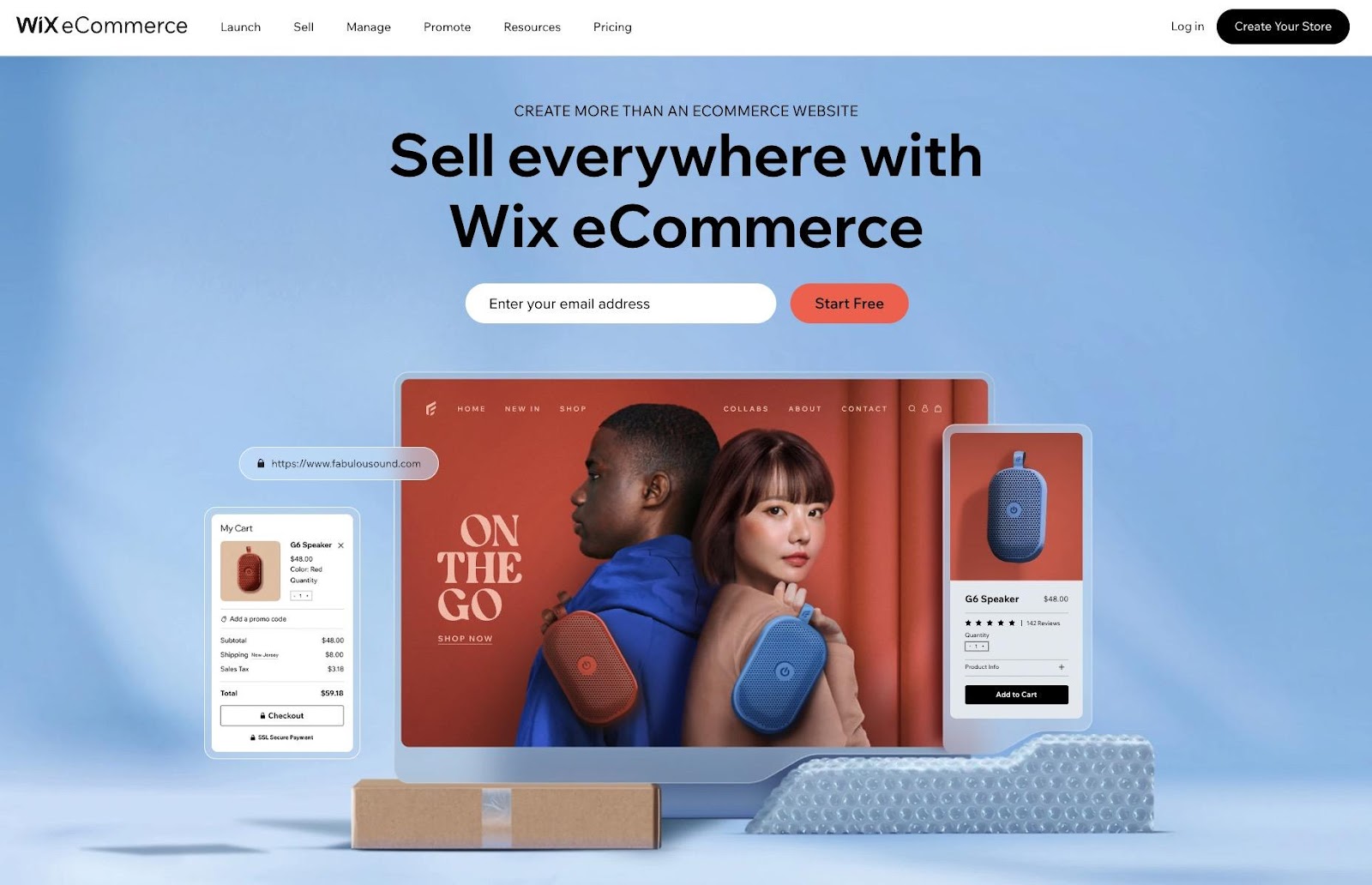
Saying Wix is for beginners is an understatement, and that’s not a bad thing. Wix has come the closest to perfecting the drag-and-drop editor; even a complete newcomer to the web design and ecommerce game can figure out how to make a beautiful, functional ecommerce store.
Wix offers plans for regular business and personal websites, but we’re more interested in its ecommerce packages. Needless to say, Wix does ecommerce well, providing an all-in-one ecommerce platform; you can sell online, post to social media, launch items through sales channels, and even run a point of sale system. It has a solid payment processing infrastructure, along with apps, themes, marketing tools, and a unified dashboard.
Pricing
Wix sells plans for personal and business websites (without ecommerce functionality). They range from Free to $45 per month. But to build an online store, you must opt for one of the Business and Ecommerce plans.
Here are the Wix ecommerce plans:
- ‘Business Basic‘: $27 per month for a complete online store, unlimited products, online payments, abandoned cart recovery, selling on social channels, online bookings, event management, reservations, art monetization, hotel listings, and fitness website management.
- ‘Business Unlimited‘: $32 per month for everything in the previous plan, plus automated sales tax, dropshipping, product reviews, subscriptions, multiple currencies, advanced shipping, and marketplace selling.
- ‘Business VIP‘: $59 per month for everything in the previous plans, plus customized reports, higher limits on things like dropshipping and reviews, and a loyalty program.
Wix has a free plan, but it’s limited in the realm of ecommerce. Wix is definitely one of the best ecommerce platforms around, but only with the plans meant to support online stores. The free plan, however, serves as a nice free trial.
Pros
- Unlimited products
- Plentiful, and highly functional, themes and apps
- There’s a free plan to test things out
- It’s the easiest design interface around
- Complete beginners can build beautiful websites with the drag-and-drop builder, themes, and apps
- The pricing is cheaper than most other competitors
- You receive essential tools like abandoned cart recovery and selling on social channels in the Basic plan
- There are unique tools built in for dropshipping, loyalty programs, and product reviews
- Wix has industry-specific dashboards and selling features for fitness, restaurants, and hotels
Cons
- Limited on storage space and video hours in the Basic and Unlimited plans
- Separate dashboards for ecommerce and web design, making it a bit confusing
- Some flexibility issues, like how it’s difficult to change the theme after you picked one
- Limited access to coding files
Who is it best for?
Beginners. If you don’t know how to code, have never designed a website, or potentially never started a business, Wix is the best ecommerce platform for you. Having said that, it’s not uncommon for more advanced users to consider Wix, especially since it released a more advanced builder with API access and developer tools.
Further reading 📚

3. BigCommerce – Best for mid to large businesses
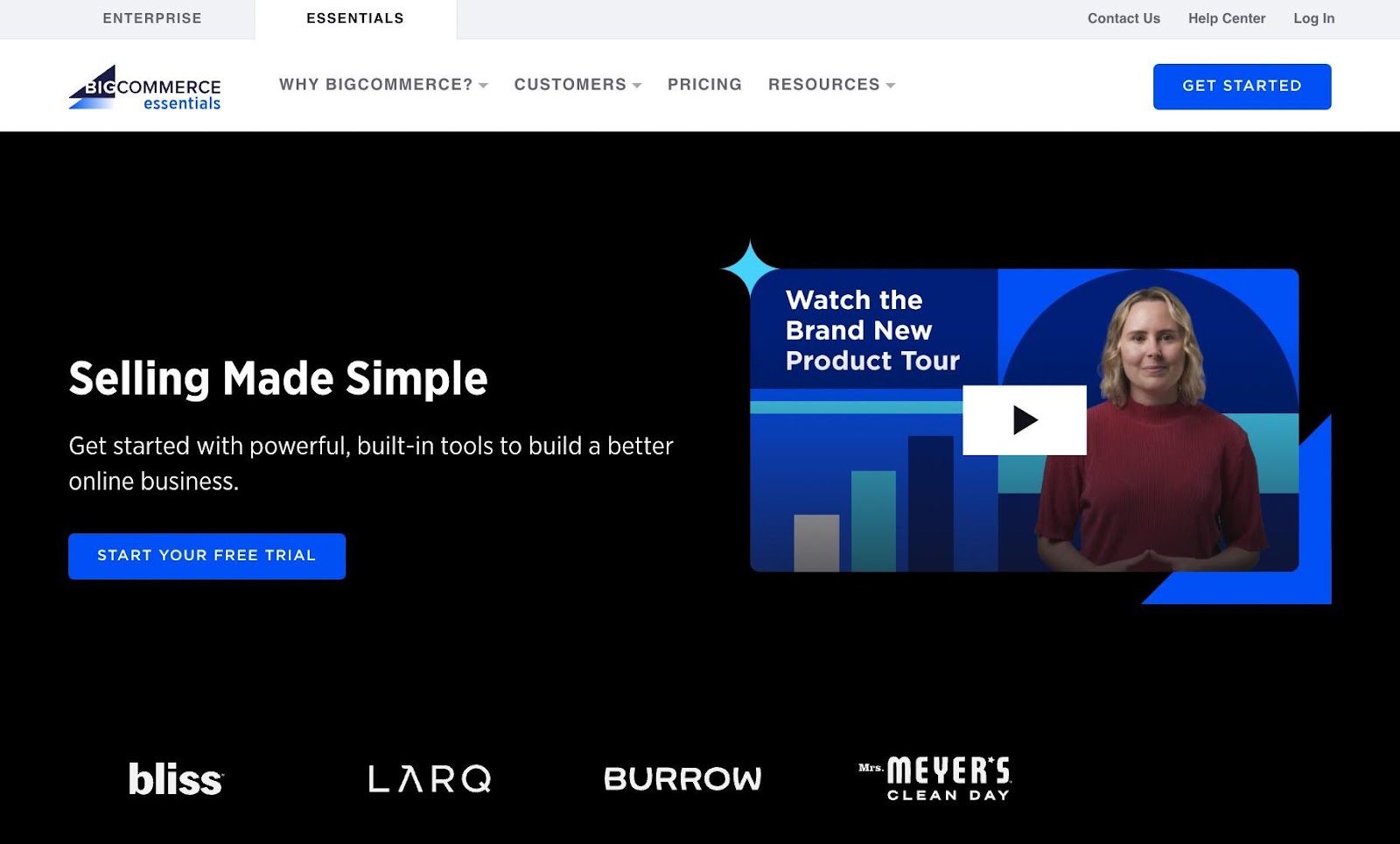
Scaling your business should be priority #1 for you as an entrepreneur. So, why not choose a platform that pushes you to grow? BigCommerce has long been the fiercest competitor to Shopify, but it has shifted its strategy as a platform that fosters rapidly growing online stores. Even its pricing is set up to raise as you increase your sales.
With both enterprise and essential pricing plans, small and large businesses alike can launch a store, grow their business, and utilize essentials like a conversion optimized checkout, an infrastructure built with native features (rather than relying on apps), and even headless commerce options for integrating your store with WordPress.
Pricing
The first pricing plan you see on the BigCommerce website is its Enterprise solution. That’s a highly customize system for high-volume businesses. You must request a demo to receive a price.
You can find the standard pricing plans under the Essentials tab on BigCommerce.com:
- ‘Standard‘: Starting at $29 per month for a complete online store with no transaction fees, unlimited staff, products, and storage, a POS, multichannel selling, multiple storefronts, social selling, Google Shopping, a single-page checkout, pro reporting, reviews, real-time shipping quotes, and a blog. This plan is for stores with up to $50k in sales per year.
- ‘Plus‘: Starting at $79 per month for everything in the previous plan, plus customer groups, segmentation, an abandoned cart saver, a persistent cart, stored credit cards, and lower credit card rates. This plan is for stores with $180k in sales per year.
- ‘Pro‘: Starting at $299 per month for everything in the previous plans, plus Google customer reviews, custom product filtering, and further decreases in credit card rates. This plan is for stores with up to $400k sales per year.
- ‘Enterprise‘: Custom pricing for everything in the previous plans, unlimited everything, the ShipperHQ shipping rules engine, price lists, unlimited API calls, express routing, priority support, a customer success manager, and the lowest credit card rates offered by BigCommerce.
The prices listed above are the yearly plans; the monthly plans are slightly more expensive (except for the Standard plan—that’s the same price).
The Plus Plan from BigCommerce is ideal for mid to large-sized businesses with its special credit card rates, abandoned cart saver, and customer groups and segmentation. While it's pricier than the Standard Plan, the added features make it a worthwhile investment for businesses serious about growth and maximizing their online presence.
Pros
- It’s a platform that relies more on built-in features, instead of piecing together multiple apps
- The multi-storefront functionality is top-notch
- Numerous tools for international selling
- You get third-party calculated shipping rates regardless of your plan
- BigCommerce has no transaction fees, and doesn’t penalize you for using a third-party payment gateway (like Shopify does)
- There’s robust reporting in all plans
- You can integrate with WordPress, or use the blogging interface, which is better than the competition
- Beautiful ecommerce themes—some of the most professional-looking templates on the market
Cons
- You must upgrade to the Plus plan for abandoned cart recovery
- They make you upgrade your plan when you reach a certain revenue mark per year
- Limited shipping discounts
- No RSS feeds through the blogging interface
- No smart rules for product categorization
Who is it best for?
Seeing as how BigCommerce requires users to upgrade their plans as their businesses grow, it makes the most sense for mid-sized and large businesses. High-volume ecommerce stores love BigCommerce for its customizable workflows, robust collection of built-in features, and conversion optimized checkout module.
Further reading 📚

4. Squarespace – Best for Creatives
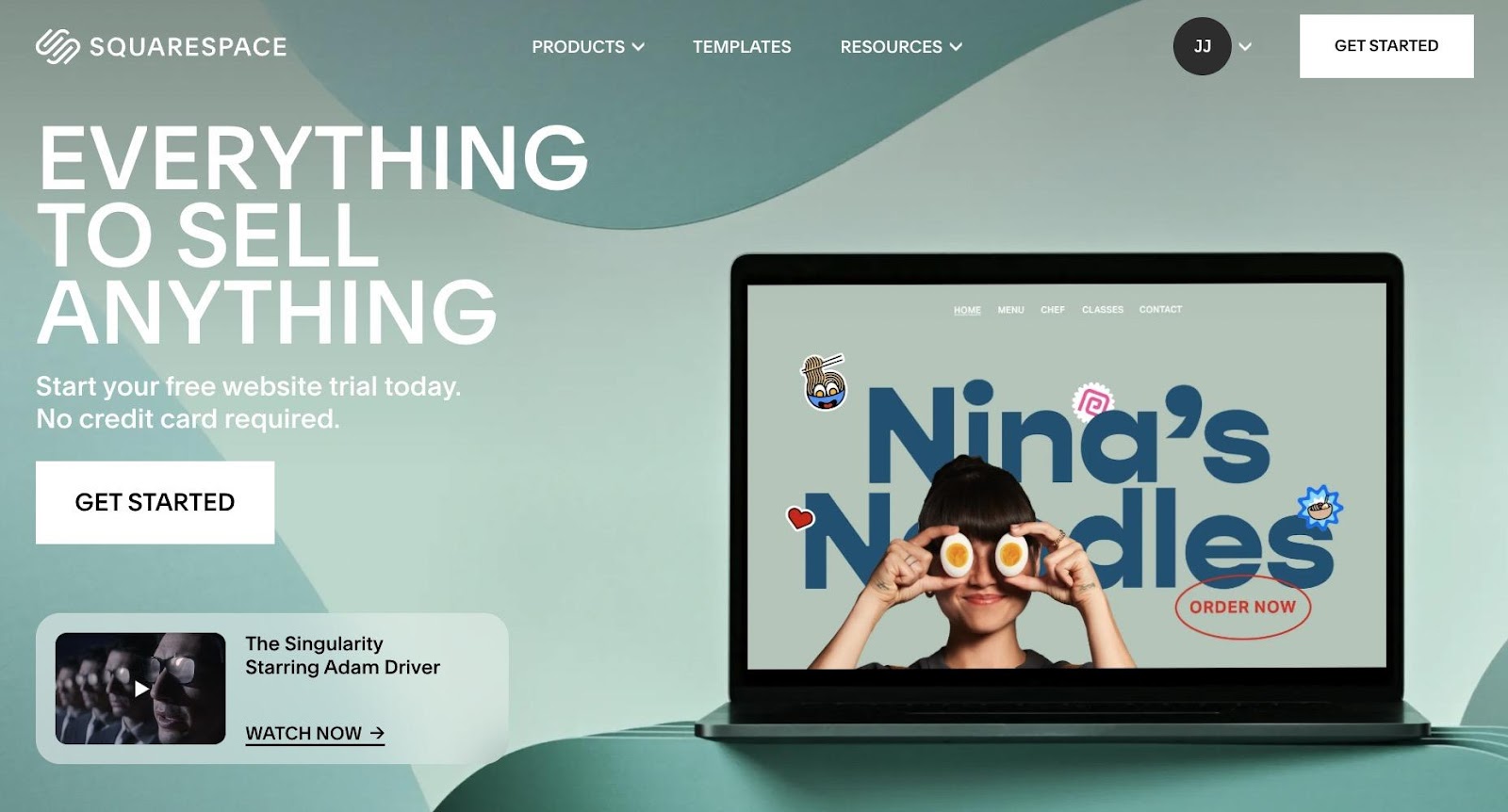
With photo-centric themes and a true drag-and-drop builder, Squarespace is the place for creatives to show off their work. On the other hand, it’s not a bad platform for any ecommerce business that plans to use high-resolution imagery on their website.
Squarespace sells all-in-one website building plans for personal, business, and ecommerce websites, yet we’ll show you why it's considered one of the best ecommerce platforms (hint: much of it has to do with its themes/design, but we also like the unique products for reservations, subscriptions, and bookings).
Pricing
We won’t list the Personal plan, even though you can embed a PayPal button on your site. It’s more for simple business/personal websites.
Otherwise, Squarespace has three ecommerce-worthy pricing plans:
- ‘Business‘: Starting at $23 per month for a complete website with fully integrated ecommerce. There’s a 3% transaction fee, but you get templates, advanced analytics, a drag-and-drop editor, extensions, CSS/JavaScript customization, audience management, promotional popups, a video maker, and unlimited products.
- ‘Commerce Basic‘: Starting at $27 per month for an online store without any transaction fees (0%). You also receive everything from the previous plan, plus a checkout on your domain, powerful merchandising, a POS, limited availability labels, selling on Facebook and Instagram, customer accounts, and product reviews.
- ‘Commerce Advanced‘: Starting at $49 per month for everything in the previous plans, 0% transaction fees, advanced shipping, subscriptions, abandoned cart recovery, commerce APIs, advanced discounts, and advanced shipping.
These prices are for the yearly plans, which save you the most money. It’s a little pricier to pay monthly.
Squarespace offers a free trial that lasts for 14 days; they give you an option to extend that free trial for 7 days.
Pros
- Industry-leading templates with a flair for showing off high-resolution photos
- A true drag-and-drop builder
- Advanced website analytics for all plans with ecommerce support
- Unique features like subscriptions and bookings (things you’d usually need apps to get)
- Easy to navigate the dashboard
- Access to CSS and JavaScript tools in all plans
- Options for API access
Cons
- The abandoned cart functionality requires the most expensive plan
- There’s a 3% transaction fee in the Business plan
- Higher pricing than alternatives
- Templates can be restrictive, meaning you should select one that you don’t intend to change much
- Limited payment processing options
Who is it best for?
We recommend Squarespace for:
- Businesses that sell subscriptions, since it’s built into one of the plans
- Stores with online booking or scheduling needs
- Creatives, or creative businesses that want to highlight beautiful artwork, photography, or general products in a stylistic manner
Further reading 📚

5. Square Online – Best for retailers
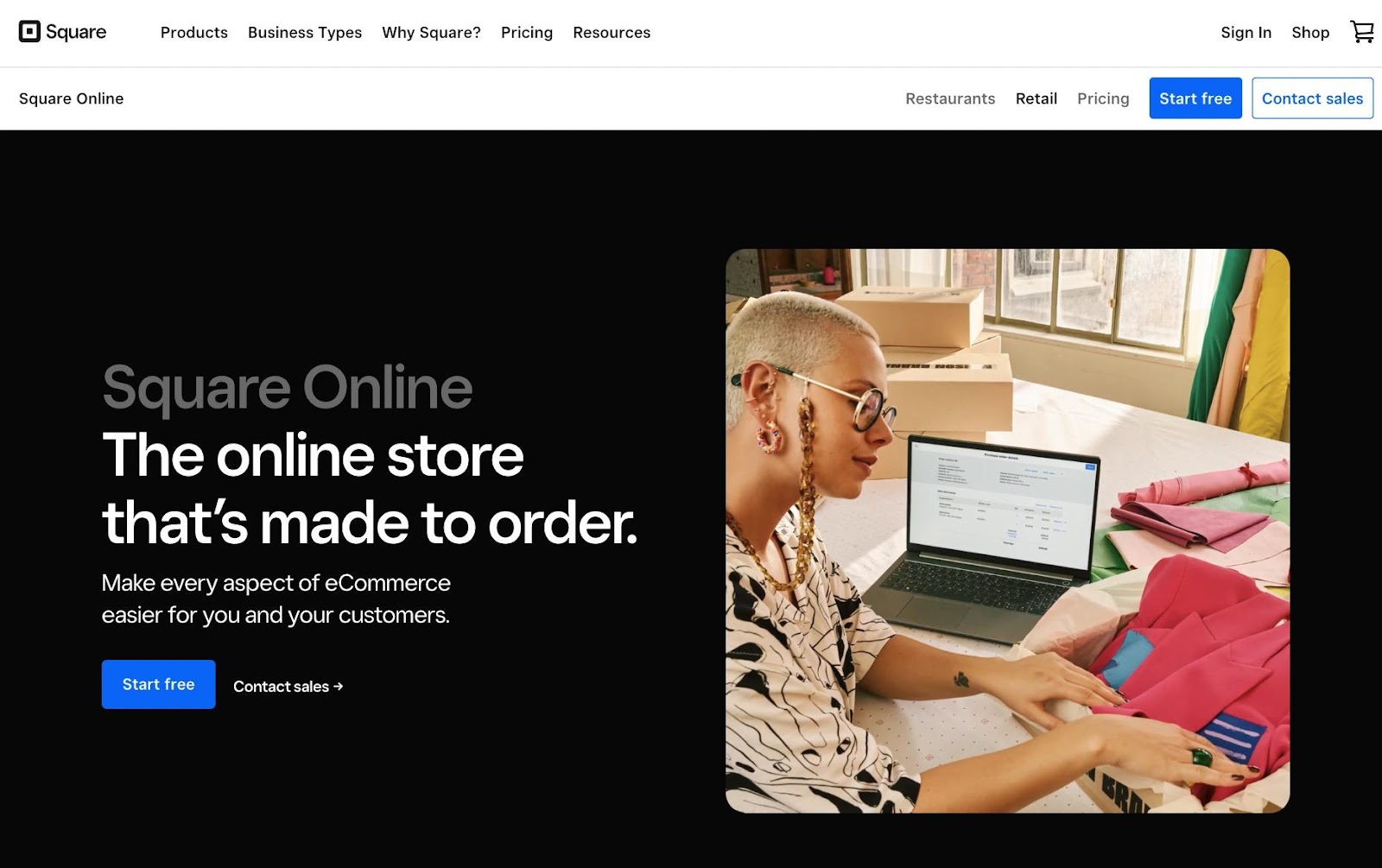
Square Online, from the well-known payment processing company, strives to provide as many free online selling tools as possible. This works out well, since merchants receive a free online store, payment processor, and promotional tools. Square makes its money by collecting credit card fees. So, there are minimal upfront costs, but you’re limited to using Square as a payment gateway.
Having said that, the free plan isn’t the only option to consider. There are premium plans for more advanced ecommerce features. But for retail and most online stores, the free plan seems like a winner.
Pricing
The vast majority of online and retail selling tools are available for free. There are, however, two premium plans.
Here’s the roundup:
- ‘Free‘: $0 for a website builder with SEO tools, acceptance of multiple payment types, Square processing already configured, a complete online store, social selling, shipping and pickup and local delivery, syncing with Square POS, order/fulfillment management, automatic tax calculations, donations, unlimited products, marketing tools, and more. This plan lacks analytics.
- ‘Plus‘: $29 per month for everything in the previous plan, plus expanded site customization, customer accounts, personalized ordering, advanced item settings, PayPal support, and self serve ordering. This plan also removes Square branding, allows for custom domains, and offers abandoned cart recovery.
- ‘Premium‘: $79 per month for all features in previous plans, plus a decreased credit card processing fee, and real-time shipping rates.
For each plan you get:
- An online store right out of the box; it’s great as long as you want to avoid customizing too much
- Intuitive interface for adding products
- You can actually integrate with other website builders and platforms
Pros
- Competitive pricing, and a free plan with most features you need for selling online and in retail
- A powerful point of sale system (with industry-leading hardware)
- Mobile point of sale
- Direct integrations between online stores and retail point of sales
- One of the few platforms with in-house, curbside, and on-demand delivery options (and self-serve QR code ordering)
- Built in methods like Apple Pay, Google Pay, and Cash App Pay
- Most marketing features come with all plans (including the free one); like a blog, lead-capture forms, coupons, social ads, social selling, and SEO
Cons
- No analytics in the free plan
- You’re stuck using Square for payment processing (not a bad thing, but it’s nice to have options)
- Free plan doesn’t allow custom domains
- The online store designs are too simple
- Not enough credit card discounts to make high-volume processing cost-effective
Who is it best for?
It’s tough to consider anything outside of Square if you’re running a retail/ecommerce hybrid. Square helps you launch a nice online store for free, while also running your entire point of sale. And it has a large selection of mobile hardware, along with unique features for self-serve ordering, in-house delivery, and order status alerts.
Further reading 📚

6. Ecwid – Best for small business / startups
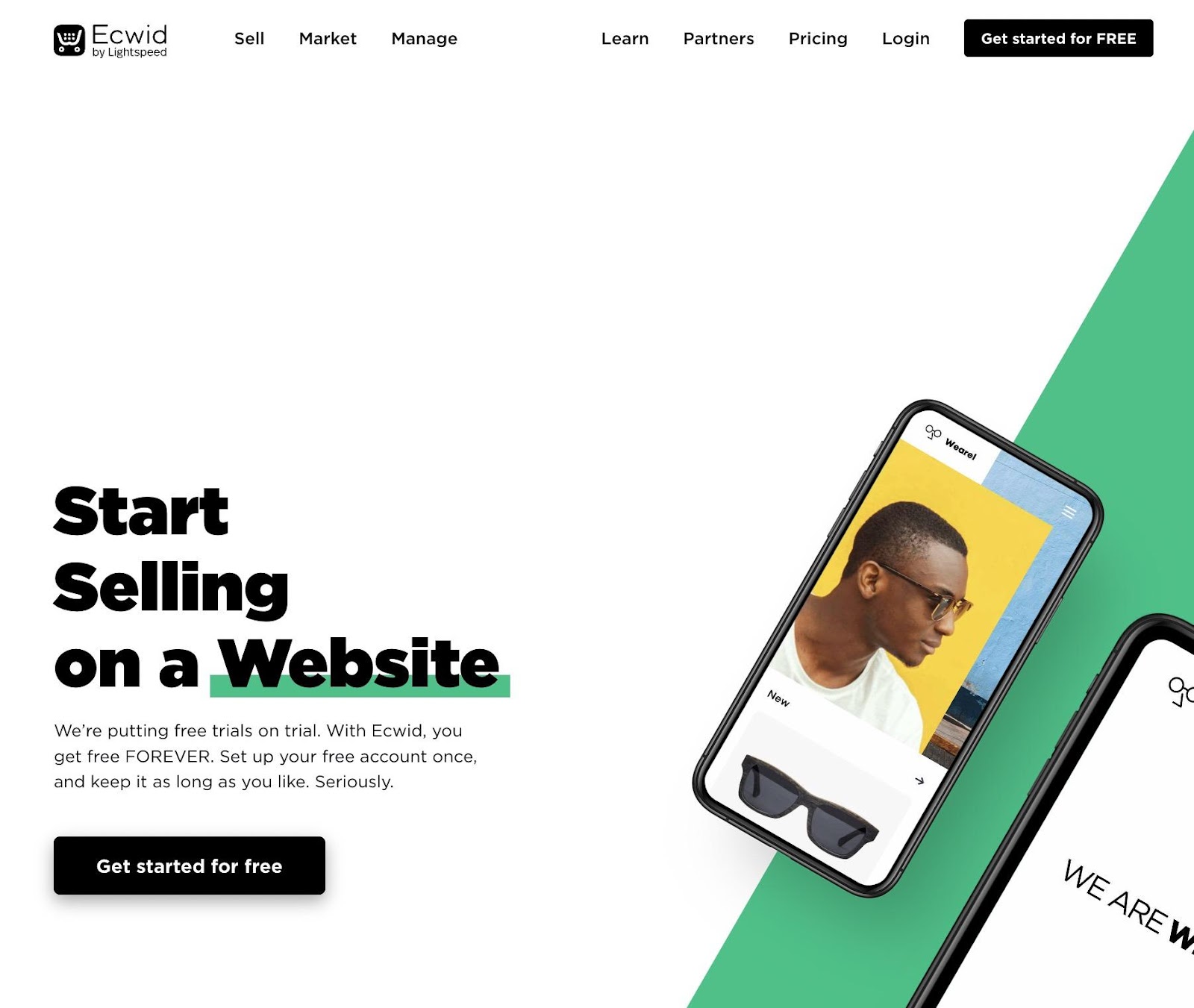
Smaller businesses, startups, and content creators should flock to Ecwid due to its external platform compatibility. That’s the entire idea behind Ecwid, to add ecommerce functionality to any website, whether it’s WordPress, Joomla, or even any of the ecommerce platforms on this list.
Ecwid offers a free plan, along with features for selling anywhere online. Pin products on social posts, sync with online marketplaces, or list products on your blog. The entire platform is similar to the Shopify Starter plan, but with far more features. That’s why we like it as one of the best ecommerce platforms for small businesses and startups.
Pricing
- ‘Free‘: $0 for an online store, social advertising, Facebook pixel, tax invoices, support for 5 products, an instant site builder, the ability to add your store to any website, themes, Apple Pay, email support, and embedding on dozens of platforms.
- ‘Venture‘: Starting at $14.08 per month for everything in the previous plan, plus support for 100 products, a Facebook shop, Instagram store, TikTok ads, discount coupons, auto tax calculations, inventory tracking, mobile apps, chat support, custom fields, custom domains, advanced SEO, pre-orders, access to extensions, Facebook Messenger, discounts, and gift cards.
- ‘Business‘: Starting at $29.08 per month for everything in the previous plans, plus abandoned cart emails, a mobile POS, selling on Amazon and eBay, automated email marketing, phone support, subscriptions, multiple languages, manual order creation, product variants, filters, advanced inventory tracking, dimensional shipping rates, more staff accounts, scheduled order pickup, and wholesale pricing groups.
- ‘Unlimited‘: Starting at $82.50 per month for all features from previous plans, plus priority support, a POS like Square, Clover, or Alice, and a potentially free (and branded) mobile app.
The above prices are for yearly plans. That’s where you’ll get the most savings. Monthly plans are available for a higher price.
Pros
- Put an online store on platforms like WordPress, Wix, Weebly, Squarespace, Joomla, Blogger, Tumblr, and more
- Advanced inventory tracking
- There’s a completely free plan
- Pricing is inexpensive across the board
- Ecwid offers the simplest way to turn any site into an ecommerce store
- Decent point of sale support
- Multilingual store versions
- Automated tax calculations
- Respectable themes with a pretty nice “instant site” builder (a great way to start your design)
Cons
- The free plan limits you to 5 products (which is truly just for content creators who want to add a few items to their blog or social site)
- In fact, only the highest plan has unlimited product support
- You can’t sell digital goods on the free plan
- Abandoned cart recovery requires the Business plan
- SEO is limited, especially in the free plan
- Not many integrations
Who is it best for?
Ecwid was made for small businesses, startups, and content creators, and it has remained that way. Every feature that comes out is meant for the hustlers and entrepreneurs out there. Its flexibility is unparalleled; integrate the online store with any other platform, and don’t worry about compatibility.

7. Easy Digital Downloads (EDD) – Best for Selling Digital Goods
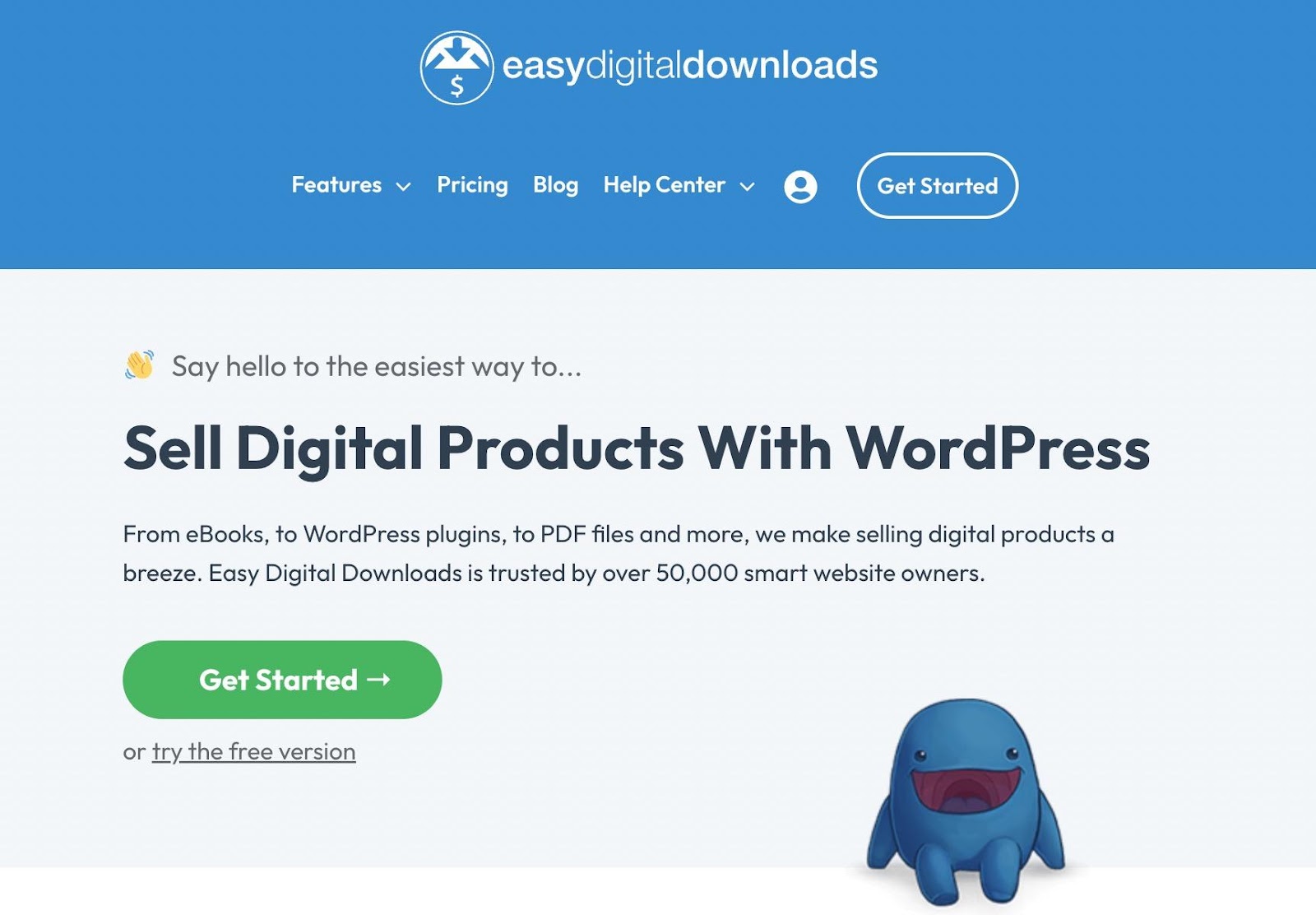
Easy Digital Downloads, or EDD, is your go-to solution for selling digital products. It’s a WordPress integration (similar to WooCommerce, but focused primarily on digital downloads), that turns any WordPress site or blog into an online store. The simplicity of EDD makes it desirable for just about any content creator interested in selling digital goods with far more advanced features for that purpose when compared to other platforms.
With EDD, you can list products like PDF files, eBooks, audio tracks, and software. EDD provides tools for accepting payments, creating discount codes, and sending out the downloadable files after someone makes a purchase. It’s one of the best ecommerce platforms in general, but primarily for digital goods.
Pricing
There is a free version, but it’s limited. We recommend using it as a free trial, then upgrading to a premium (and extremely affordable) subscription.
- Personal: Starting at $99.50 per year to support one site and receive a multi-currency interface, an “add to cart” popup, acquisition survey, free downloads, per product emails, cross-selling and upselling, a variable price switcher, and social discounts. You also get all email marketing extensions from EDD.
- Extended: Starting at $179.55 per year for everything in the previous plan, plus all payment gateway extensions, and an onslaught of other features like PayPal, Stripe, a wallet, conditional gateways, Zapier, a pro version for discounts, Dropbox storage, Braintree, recurring payments, content restriction, and support for Authorize.net.
- Professional: Starting at $269.55 per year for everything in the previous plans, plus custom deliverables, recently viewed items, EDD wishlists, checkout fields manager, file uploads, frontend submissions, purchase limits, recommended products, simple shipping, push notifications, software licensing, and commissions.
- All Access Pass: Starting at $399.60 for all previously listed features, plus a long list of advanced features such as re-sent receipts, slack integrations, campaign tracking, advanced reports, fraud monitoring, featured downloads, terms per product, coupon importer, widgets, Gravity Forms checkout, and more.
The above prices are the regular promotions, so you may see slightly higher prices. But EDD has frequent discounts similar to what’s listed. Each plan allows for an unlimited number of products.
Pros
- It integrates with WordPress, which should be a comfortable interface for most content creators looking to sell digital products
- Although it’s limited in its features, EDD offers a free plan that’s suitable for testing the platform
- Easy setup
- It’s ready to go right out of the box
- Excellent reporting
- Far more features for digital sales than any other platform
- Highly customizable checkout module and product pages
- Dozens of extensions for things like recurring payments, software licensing, comparing products, and generating QR codes (there are also numerous third-party extensions to seek out)
- Multivendor support for building a marketplace
- Secure file storage and pirating protection
Cons
- You can’t add it to any other platform besides WordPress
- Limited customer support (they typically just try to send you to online documentation)
- The list of extensions gets confusing (we’d rather many of these features were built into the platform)
- Many users say the default checkout and page designs seem outdated
Who is it best for?
Easy Digital Downloads stands strong as the top contender for digital sellers. If you create eBooks, PDFs, music, videos, courses, or anything that requires email delivery, EDD makes it all happen. For that reason, we like it for content creators everywhere. If you’ve ever tried to use Shopify or WooCommerce for digital downloads, you’ll know that there are many features missing. EDD covers it all for you.

8. Medusa.js – Best Open Source Platform
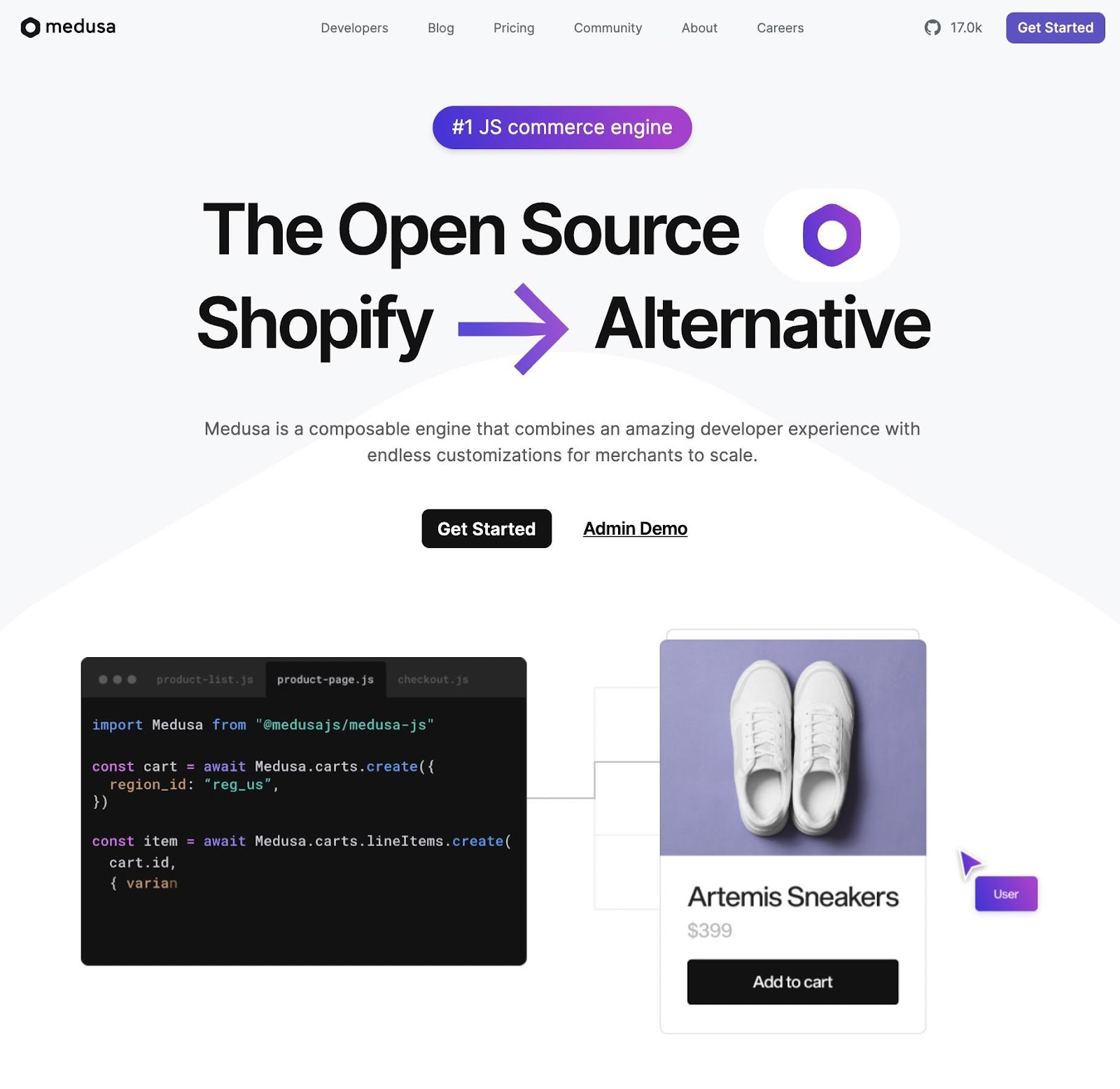
Billed as an open-source alternative to Shopify, Medusa.js provides developers an opportunity to build ecommerce sites for free. It’s similar to WordPress, but with a more advanced interface. We’d argue it replaces Magento as the #1 open-source ecommerce platform, since Magento is now owned by and sold by Adobe.
Having said that, the Medusa.js website is rich with development documentation. You can build and integrate anything you want with the system, and there’s a strong community to fall back on for questions and discussion.
Pricing
- The self-hosted version is free forever.
- You must contact Medusa.js for a price quote to get premium customer support.
The creators of Medusa also offer referrals to developers if you need someone to create a site for you.
Pros
- It’s extremely fast
- The frontend is unattached from the backend, making for a less bulky interface
- Deployment only requires three commands
- It’s designed for developers
- Build a completely custom website, with endless integrations
- It’s completely free
Cons
- The built-in features are limited; you’ll find it pretty barebones if just moving from a platform like Shopify (The point, however, is to build from the ground up with Medusa.js)
- The themes are fairly rudimentary
- There aren’t many plugins to choose from
- You must have a developer, or be a developer yourself, to use Medusa.js; it’s too complicated otherwise
Who is it best for?
We like it for developers who want a free, open-source system with more potential than WordPress and advanced customization you can’t find from some of the best ecommerce platforms like Shopify and Bigcommerce. This definitely isn’t a platform for beginners.
Further reading 📚

9. WooCommerce – Best for WordPress Sites
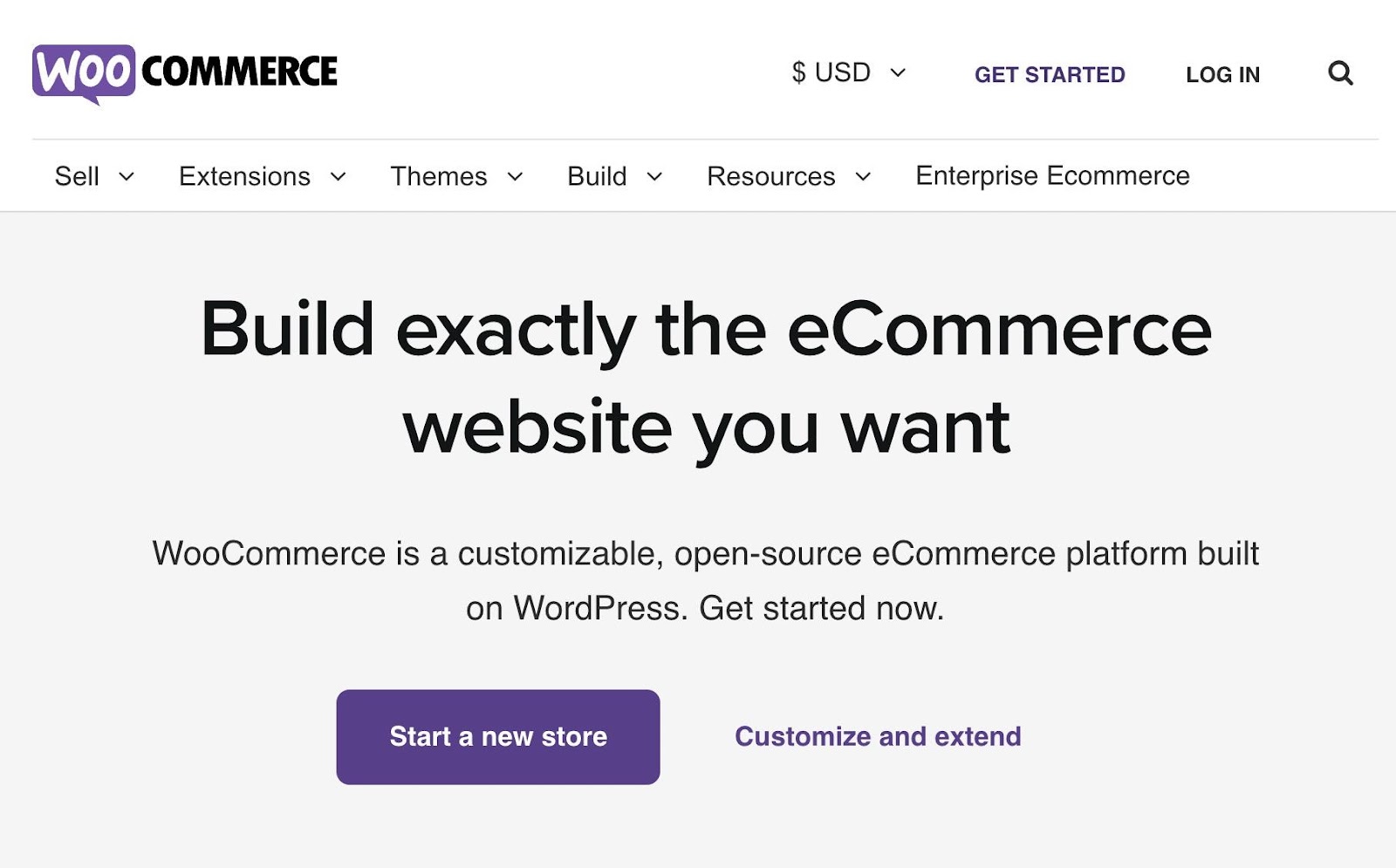
WooCommerce falls between Shopify and Medusa.js in terms of its user base and user-friendliness. WooCommerce turns any WordPress website into an online store. WordPress is open-source and free. The WooCommerce plugin is also free. It works well right out of the box, but most legitimate online stores require additional extensions for full functionality.
WordPress offers the best blogging platform in the business. It’s wonderful for content creation, but you must keep in mind that it’s highly customizable. This is a good thing for some people (like developers), but may feel intimidating to others. For example, you must go out and get a theme, a hosting package, and site optimization plugins.
Pros
- Sell anything, and make any type of online store; from marketplaces to digital goods, and physical items to auctions, it’s all possible with WooCommerce
- The plugin is free
- Themes and extensions are affordable and readily available
- There’s a strong community and plentiful documentation about WooCommerce online
- Limitless customization, with access to site files and coding areas
- Integrate with any of the popular payment gateways
- Solid “getting started” guide
- Quality security
- Unlimited products
- Solid reporting and inventory management
Cons
- Extras are almost always necessary; you’ll end up installing things like optimization plugins, along with ecommerce extensions for subscriptions, payment gateways, and merchandising
- Extra costs can build up, whether it’s for development fees or extension subscriptions
- It takes a considerable amount of work to make a functional, good-looking store
- Shipping rates aren’t included out of the box
- You can’t easily sync with marketplaces like Etsy or Amazon
- Speed and performance is heavily reliant on your host
Who is it best for?
If you’re comfortable creating content on WordPress, or already have a website running on WordPress, WooCommerce is the marquee solution for selling online. The main reason you’d go elsewhere is if only selling digital goods (in that case, go for Easydigitaldownloads).
WooCommerce is also popular with developers, or merchants who crave full control over the customization of their websites. It’s not quite as simple as Shopify or Squarespace, but you have significantly stronger customization tools.
Further reading 📚

10. Webflow – Best for No-Code Store Design
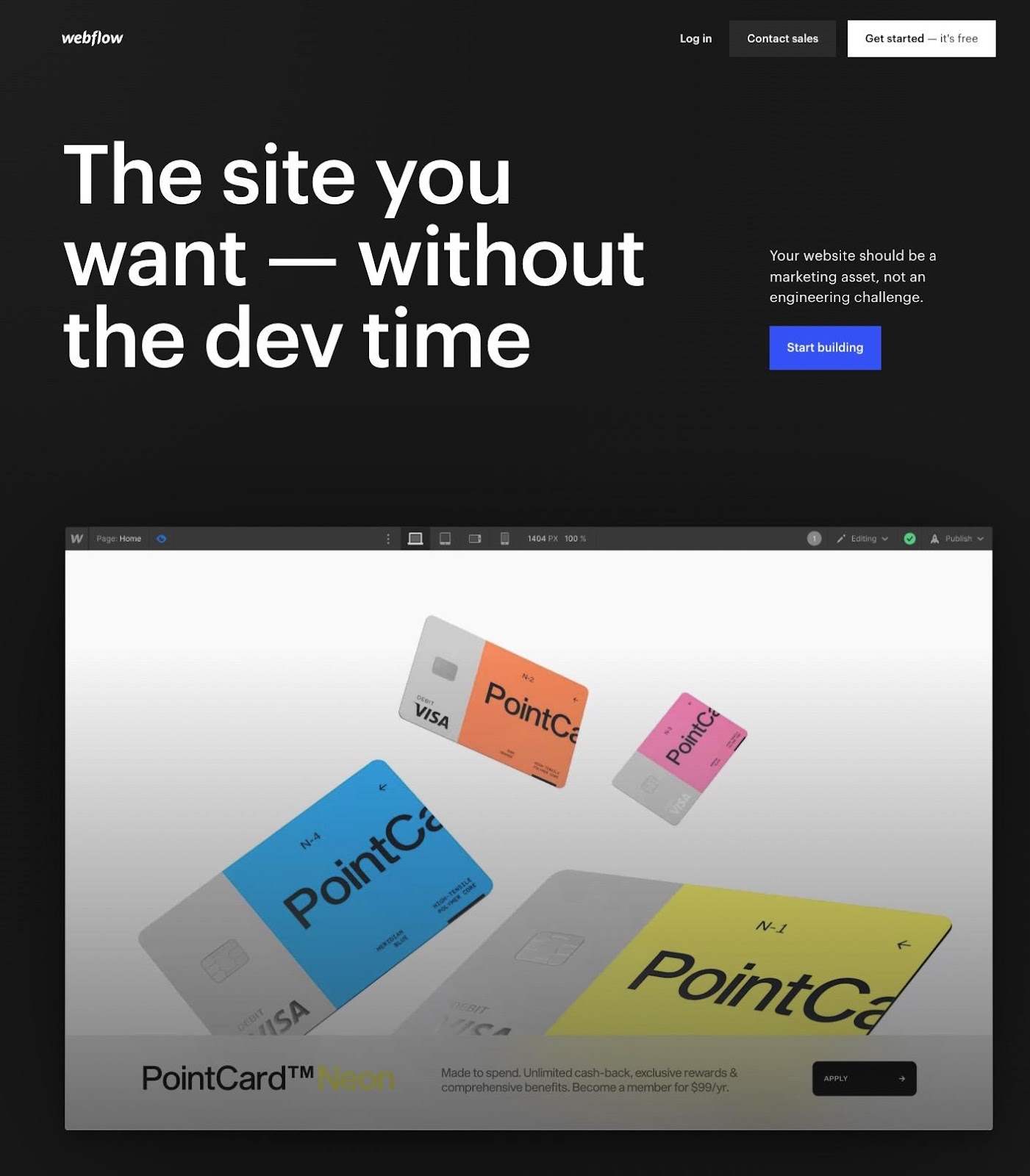
If your main priority is to avoid code altogether, take a peek at Webflow. It’s a highly customizable, drag-and-drop website builder that automatically adjusts website coding based on the visual modifications you make. Essentially, Webflow reverses the development process, building visually first, then generating the necessary code.
Due to this methodology, it’s possible to never touch a line of code while constructing a Webflow online store. We won’t say it’s necessarily good for beginners, but rather a speedier option for developers to make highly customized sites. For that reason, Webflow is one of the best ecommerce platforms.
Pricing
General websites have their own pricing packages, ranging from free to $49 per month, but ecommerce plans are a different story.
You have three Webflow subscriptions to choose from for an ecommerce store:
- Standard: Starting at $29 per month for 500 products, 2,000 CMS items, a 2% transaction fee, custom checkout, custom shopping cart, email product fields, email customization, Stripe, PayPal, Apple Pay, auto tax calculations, unlimited sales, social selling, Mailchimp integration, custom code integration, manual shipping rules, and 3 staff accounts.
- Plus: Starting at $74 per month for everything in the previous plan, plus 0% transaction fees, 5,000 products, 10,000 CMS items, unbranded emails, and 10 staff accounts.
- Advanced: Starting at $212 per month for 15,000 products, 10,000 CMS items, and 15 staff accounts.
The above pricing is for yearly billing, which gets you the best rate. Pricing goes up if paying on a monthly basis.
Pros
- Absolutely no need for coding
- Highly customizable online stores with excellent SEO
- Integrations with numerous third-party extensions and widgets
- Dynamic content and product collections
- Live prototyping for visualizing every change you make to your ecommerce site before publishing
- Excellent collaboration tools for building online stores with a team
- Web hosting is included, fast, and secure
- You gain access to thousands of templates
Cons
- When you need to edit code, it’s not all that intuitive
- Although it’s a no-code designer, there is a fairly steep learning curve
- There’s an arbitrary limit of 100 static pages
- Some basic ecommerce functionality isn’t built into the system, like filters and subscriptions
Who is it best for?
Webflow is an interesting case because you can customize anything on your website (giving you more control than from a platform like Shopify), yet it doesn’t use any code (so it’s actually somewhat like Shopify with visual building). However, it’s not quite as user-friendly as Shopify. So, we’d argue that Webflow is for intermediate users who want a faster way to develop incredibly customized online stores. We’d recommend Webflow for online store owners who intend to hire a developer, but they still would like to learn how to customize the site themselves. It’s a middle ground platform where both developers and beginners can dabble.

Other Ecommerce Platforms to Consider
If you haven’t found a solution from our list of the best ecommerce platforms, here are some other options that are widely used and recommended from our testing.
Adobe Commerce
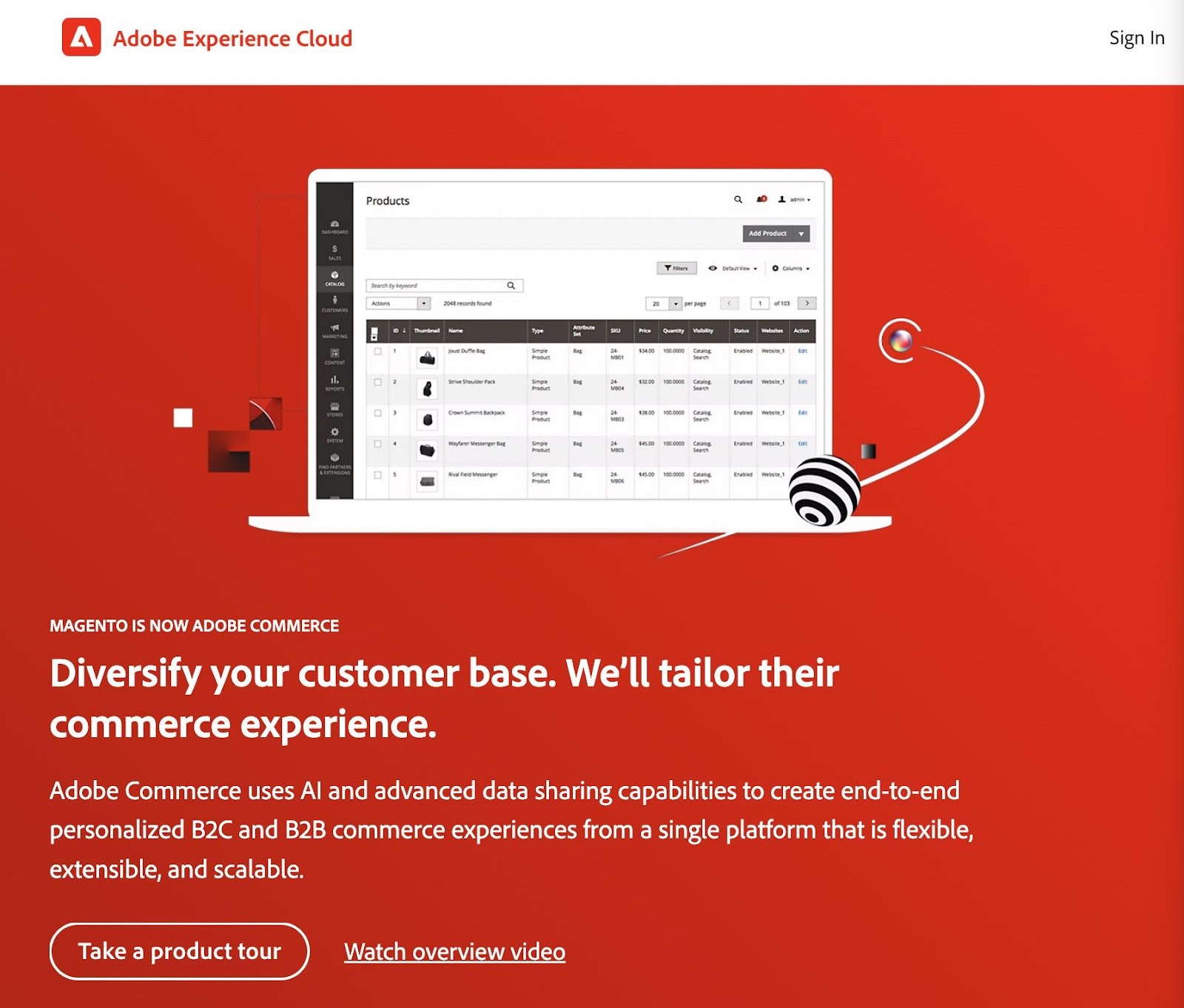
Adobe Commerce used to be called Magento. It was an open source, highly customizable ecommerce platform that fueled millions of online stores. After its purchase by Adobe, things have changed a bit. You can still technically download the open-source version of Magento, but all updated features come in the Adobe Commerce Pro package.
The pricing is customizable, and requires a demo and quote. Having said that, it’s a powerful online store building solution with image optimization, deployment tools, API access, and extreme customization. We like it best for B2B merchants, but it stands strong for B2C due to its agility, integrations, and handling of spikes in traffic.

Podia
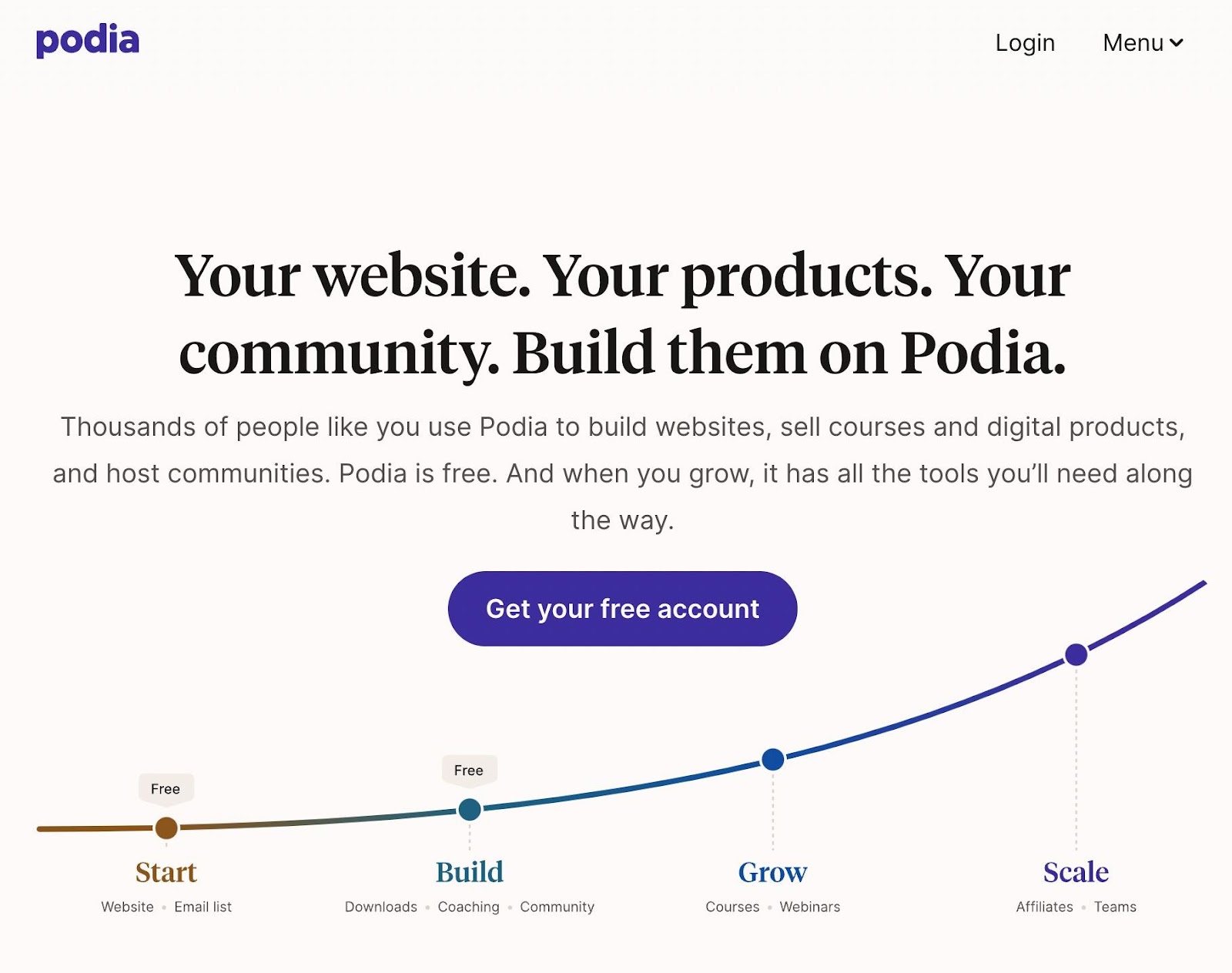
Podia has its footing in the online course market, but actually serves as an all-in-one ecommerce platform. It has a free plan with extremely high transaction fees, along with two other plans that start at $33 per month. We recommend Podia for online course sellers, or those with digital downloads. It’s popular with merchants selling webinars as well.
Some benefits of Podia include its built-in community features, where you can create topics, accept members, and upload videos to the community. There’s also email marketing, coupons, affiliate marketing, and sales tracking. Not to mention, Podia offers advanced tools for PayPal, social tracking, Zapier triggers, and third-party code.

Gumroad

Gumroad is one of the most popular places for content creators to sell online. For one, it’s free to use. The startup costs remain low (Gumroad makes most of its money from slightly higher than average transaction fees).
The beauty of Gumroad is its simplicity. You’re definitely not making a fully branded online store, but you receive a landing page shop and payment processing right off the shelf. The pricing is straightforward: 10% of all sales, and that’s it. No monthly subscriptions involved. Features include a custom landing page, embedding on other websites, simple memberships, subscriptions, multiple currencies, payment processing, coupons, and digital products (in fact, that’s what you’ll mainly sell on Gumroad).

Zyro by Hostinger
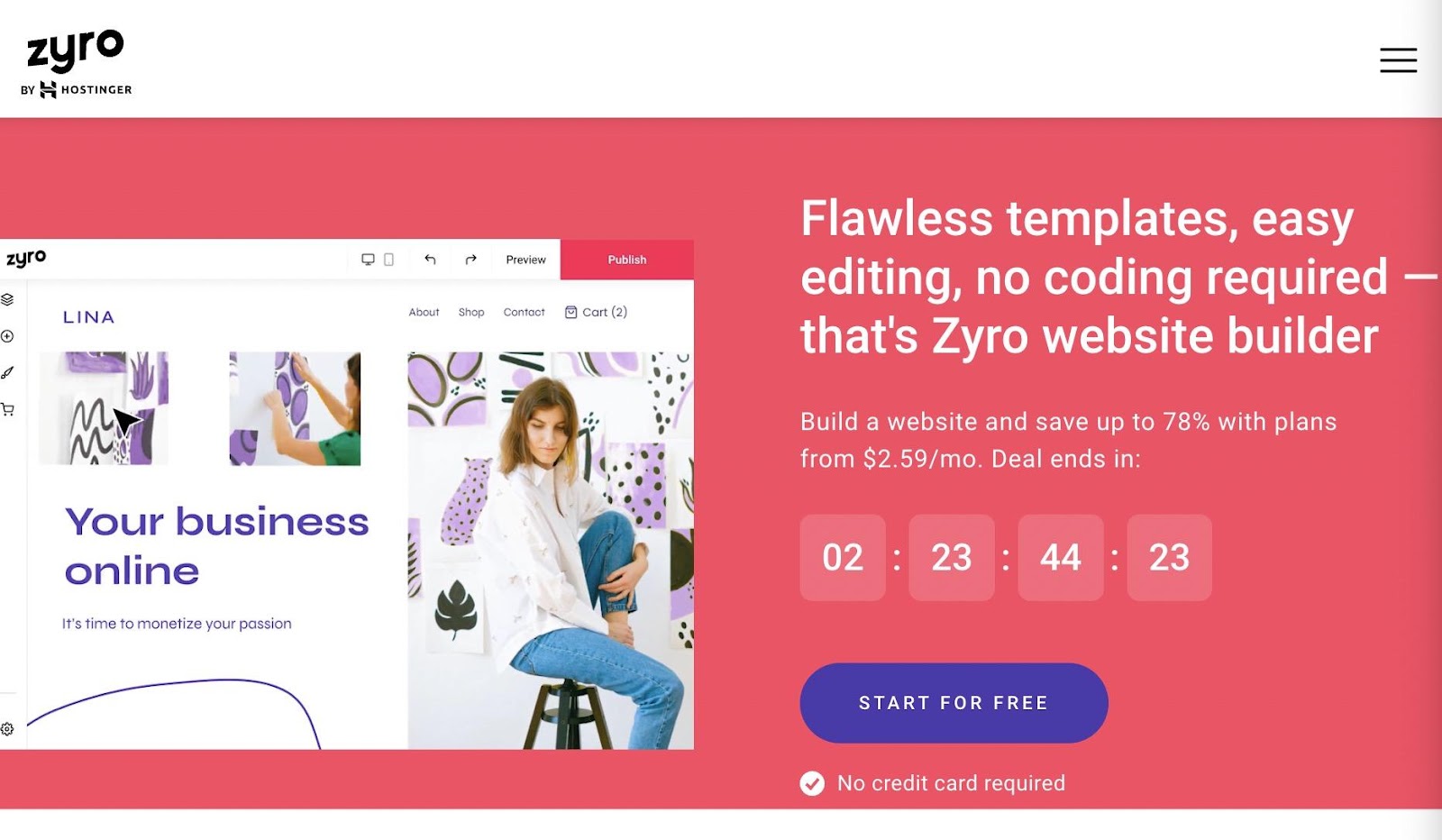
Zyro is a website building and ecommerce platform solution from Hostinger. It’s mainly a way for Hostinger to get you to sign up for their website hosting, but Zyro is actually a powerful tool in itself. Pricing starts at $3.59 per month but, in typically Hostinger fashion, will increase after the promotional period. For the Business (Ecommerce) plan, expect to eventually pay $14.99 per month.
Other than that, we consider it one of the best ecommerce platforms if you like a simple setup, intuitive inventory management, and automated selling tools. You get paid instantly using methods like Google and Apple Pay, and have hundreds of ecommerce templates to choose from. Not only that, but the shipping and delivery gets handled within Zyro, with automated shipping statuses, payment tracking, and order histories.

Frequently asked questions 🤔
If you encounter specific questions during your research, read through the following FAQs to help you along the way. In this section, we provide honest answers to the most pressing questions. This way, you have ideas for which ecommerce platforms to utilize based on your industry, the size of your business, and which types of features you may need.
Many of the FAQs serve as summaries of what was outlined above, but we also touch on the best ecommerce platforms for things like SEO, dropshipping, and more. So, if you're still struggling to narrow down your search, use the FAQs to help!
What's The Best Ecommerce Platform for SEO?
What's The Best Ecommerce Platform for Small Business?
What's the best Ecommerce platform for Dropshipping?
What's the Best Free Ecommerce Platform?
What's the Best Platform for B2B?
What's the Best Open Source Ecommerce Platform?
What are the Best Ecommerce Platforms for Startups
Best Ecommerce Platform for Selling Digital Products
“Can you help me to create a store using Shopify / BigCommerce / Wix?”
Yes, I do work with experts knowledgeable in each of these popular ecommerce platforms. Please fill out this form to make sure I will be able to recommend you the right people to work with.



Comments 155 Responses